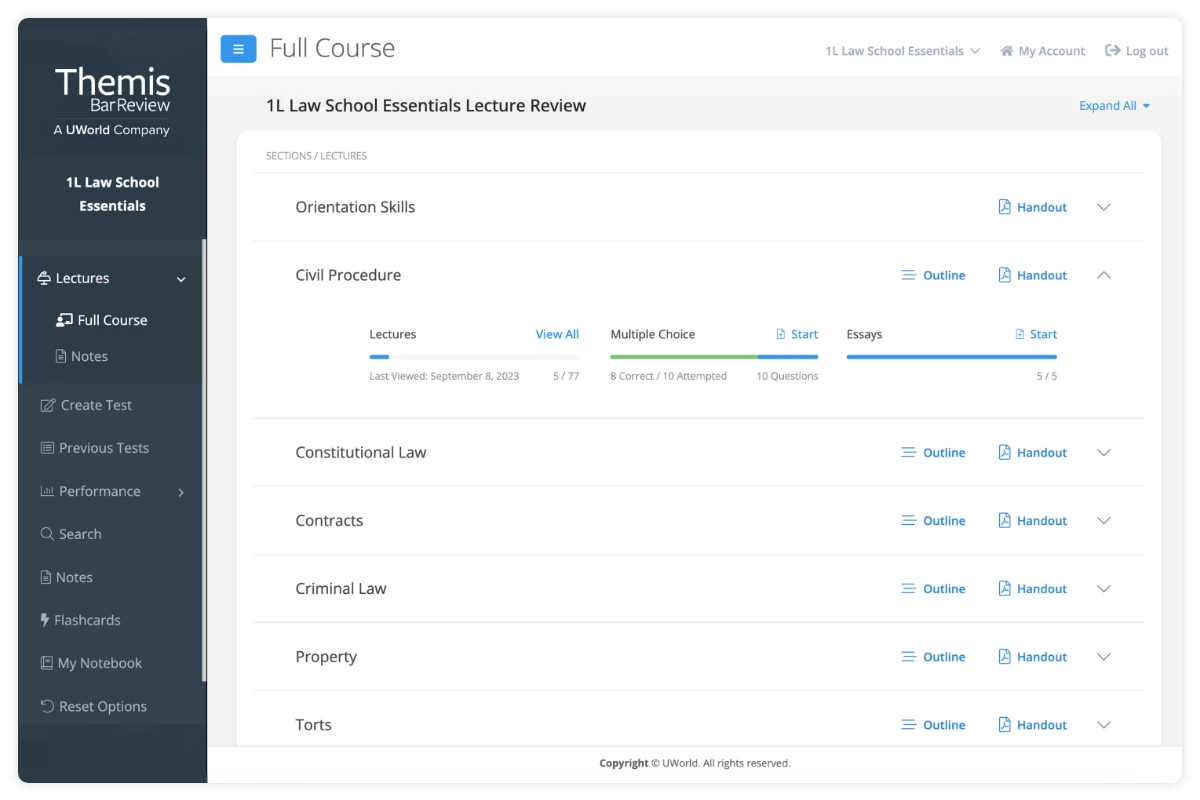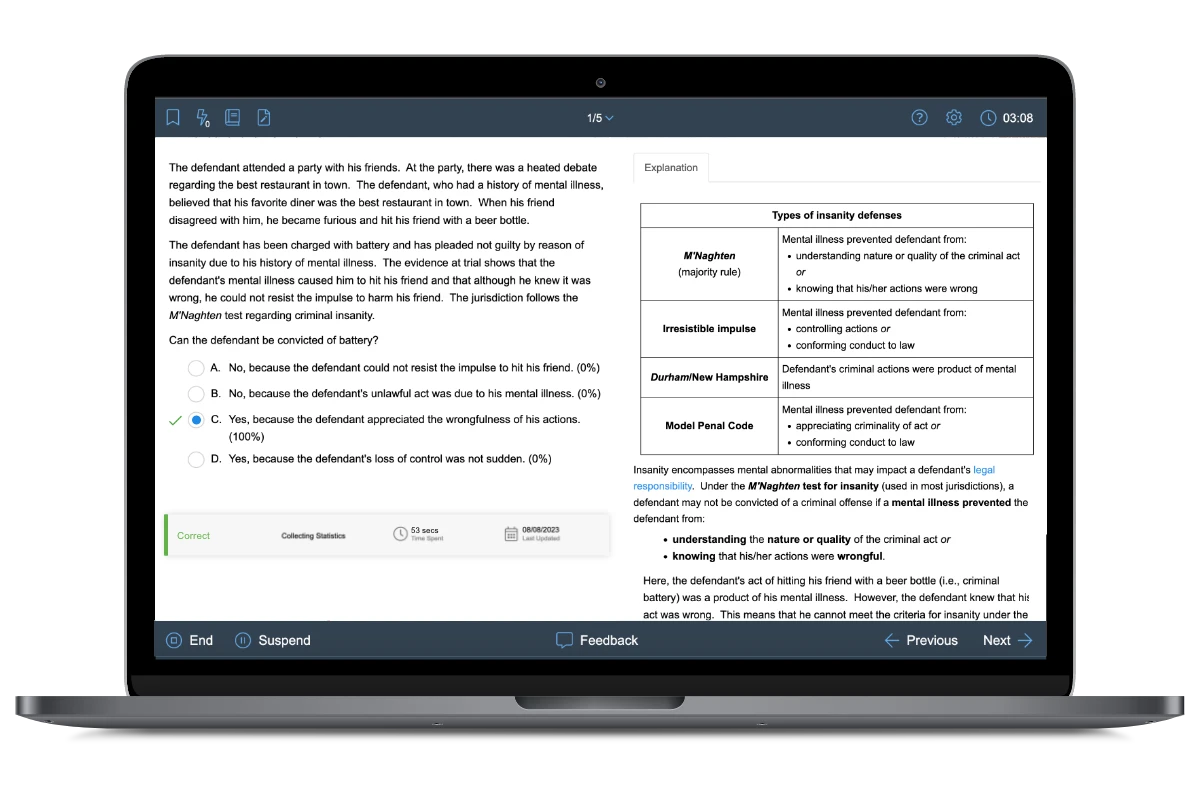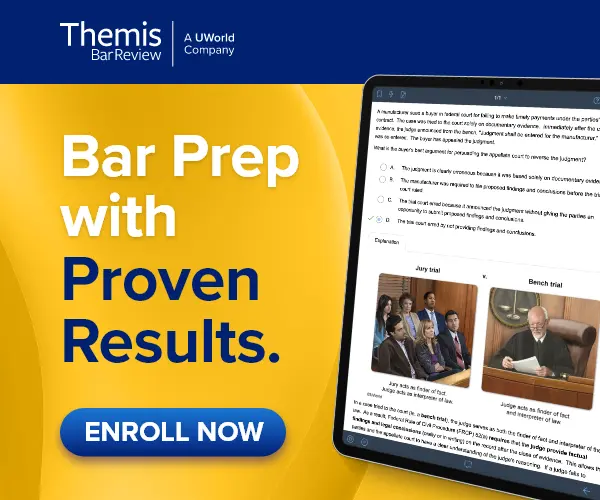Get Ahead and Stay Ahead in Your 1L Year
There's no use sugarcoating it—law school is challenging. And for good reason. Your future clients and employers must be confident in your competence and resolve. But here's the good news—you can make your 1L year a fulfilling (and maybe even fun?) challenge by setting realistic expectations and preparing the right way. Below, we’ll cover key tips to help you get ahead in your 1L year and stay ahead throughout law school.
Understanding the Challenges of Year One
Law school is not merely an extension of your undergraduate studies. It's a transformative experience that shapes you into a self-regulated learner. You're not just memorizing laws. You're learning to think like a lawyer. This means gaining proficiency in a new "language," often penned in legal jargon from another era.
The first few weeks are a whirlwind, characterized by a heavy reading load that may seem overwhelming. Don't underestimate the importance of reading the class material. Your professors typically base your grade on a final exam featuring hypothetical scenarios known as "hypos." There is a grading curve, which adds a competitive edge, but it's also an invitation to excel. Legal research and writing are integral to the curriculum, introducing you to memos, briefs, and oral arguments.
Addressing Anxieties and Uncertainties
Starting law school often comes with a mix of excitement and anxiety. You're not alone if you experience imposter syndrome, that nagging feeling that you don't belong or are not as qualified as your peers. Most of your classmates are going through the same emotional rollercoaster. It's natural to question your capabilities, especially in an unfamiliar environment filled with new challenges.
The key is not to let these uncertainties control you. Remember, you earned your spot in law school through hard work and dedication. Over time, as you adapt to the teaching methods and rigor of the curriculum, many of these anxieties will diminish. While challenges remain, facing them with optimism can significantly lessen their impact.
Excel At Time Management and Organization
Succeeding in your 1L year requires more than intelligence— exceptional time management and organizational skills. From the get-go, you're juggling a lot: classes, readings, assignments, and possibly work. Here are some strategies to keep you on track:
- Structured Study Schedule — Create a weekly and daily schedule to allocate time for each subject and activity.
- Prioritization — Some tasks are more urgent or more important than others. Learn to prioritize effectively.
- Time Blocking — Segment your day into dedicated blocks for study, leisure, self-care, etc.
- Deadlines — Keep track of all deadlines and work towards them, and work ahead where possible to cushion unexpected delays.
- Rest and Recharge — Never underestimate the importance of breaks and downtime. They're essential for sustaining long-term focus and energy.
Elevating Your Study Techniques
To excel in law school, you must go beyond passive reading and listening and become an active learner. Adopting the right study techniques can dramatically improve your ability to grasp complex legal concepts and perform well in exams. Here's how:
- Read Intentionally — Before diving into a case, ask yourself, "Why am I reading this? What's the purpose?" This approach will help you spot issues, apply rules to various scenarios, and develop a critical eye.
- Take Action Before Reading — Creating an outline or goal list guides your reading process and ensures you're looking for relevant details, which increases productivity.
- Note-taking — Jotting down essential details in the margin or a notebook helps you build case briefs and gives you quick reference points, streamlining your review process.
- Highlighting and Underlining — Different colors can signify different elements like facts, rules, or key terms. This visual aid speeds up your ability to spot crucial components of a case.
- Case Briefing — Creating a case brief helps you distill complex information into an easy-to-read format. Briefs make it easier to find relevant information later and are especially useful for issue spotting.
- Multiple Read-Throughs — Skim, then read carefully, and return for a review. This will help you discover missed details and connections. Each pass enriches your understanding and prepares you for class discussions and exams.
- Issue Spotting — Case briefs help you become adept at identifying key issues, thereby improving your analytical skills. Understanding the issue is critical for effective problem-solving in exams and real-life legal scenarios.
Supplementing Your Classes
You're already going to be loaded with textbooks and lecture notes. Why would you need a supplement? Hear us out—throwing some extra learning tools into the mix can seriously level up your law school game. Law school is competitive. Grades are curved, so doing just the bare minimum isn’t going to cut it.
That's where supplementing comes in. Think of a supplement as your academic personal trainer, offering skills development, feedback, and fresh perspectives that you won't get in class. This isn't just about cramming more info into your brain; it's about practicing the skills you need to excel in law school and impress your professor. A little extra hustle now will pay off big time later.
Fortunately, there are free law school courses designed to help you get ahead and stay ahead. Themis Bar Review offers a 1L Law School Essentials™ program that offers outlines, Key Concept Sheets, training on essay practice questions, multiple choice practice questions, video lectures, and more.


Building Meaningful Relationships
Building relationships in law school is key to success and well-being. Form study groups with classmates to collaboratively tackle challenging material, and don't overlook the benefit of attending your professors' office hours for deeper insights into complex topics.
If your school offers a mentorship program, participate actively. A mentor can offer career advice and help you navigate academic hurdles. Networking events, internships, and professional associations also provide vital connections for your future career. Maintain ties with family and friends. Their emotional support can be a powerful stress reliever during the rigors of law school.
Prioritizing Self-Care and Stress Management
Law school is undeniably stressful, but it's crucial to remember that your well-being is a priority. Without effective self-care, even the most dedicated students can burn out. Consider integrating stress management techniques like mindfulness and meditation into your daily routine.
Physical exercise can also be a game-changer. Even a quick 20-minute walk can help clear your mind and reduce stress. Prioritize sleep. Lack of rest affects your mood and your ability to concentrate and learn. Finally, don’t hesitate to seek professional help if the stress becomes overwhelming. Many schools offer mental health resources, and taking advantage of these can provide you with the tools to handle stress more effectively.
Embracing Challenges and Failures
The ups and downs of your 1L year are more than just transient experiences. They're formative moments that shape your legal education. When faced with challenges or setbacks, cultivate a growth mindset. Ask yourself, "What can I learn from this? How can I improve?" Rather than viewing setbacks as final, see them as stepping stones to becoming a better student and, eventually, a better lawyer.
If you find yourself struggling, don't hesitate to seek support from academic advisors or tutors. Their guidance can be invaluable. Remember, skill in law, like any other discipline, isn't innate—it's cultivated through hard work and persistence. By adopting a mindset geared toward growth and resilience, you'll be well-equipped to navigate the inevitable challenges of law school and your future career.
Recent Posts
Law School Outlining for Final Exams: Apply, Don’t Memorize
1L November Playbook: Use Your Law School Outlines to Finish Strong
Law School Note taking: Five Things That Belong in Your Class Notes
Elements = Legally Significant Facts
How to Recover After a Difficult Law School Semester
Best Study Strategies for Neurodivergent Law Students
7 Highly Effective Memorization Techniques for the Bar Exam
7 Legal Writing Tips for Law Students
The Art of Outlining for 1L Final Exams
Balancing Academics and Extracurriculars: Time Management Tips for 2L Students
7 Strategies to Prepare for the Socratic Method During 1L Year
How to Make a Bar Exam Study Schedule | 5 Tips with Examples
A Law School Student’s Guide to Stress and Burnout
Ace Your 1L Exams: 9 Actionable Tips from an Attorney
Tackling the MPRE with Confidence
A 1L Student's Guide to Legal Language
Navigating Your First Year of Law School: Tips for Success
Trust, Transparency, Results: The How and Why of Themis Pass Rates
Holiday Party Etiquette Advice for Almost Lawyers
Halloween Costumes That Only a Lawyer Could Love
Secrets To Breaking Through The 'Breaking Points' of Law School and Beyond
Brutally Honest 1L Advice From A Brilliant, Bitterly Brunette Attorney
2L/3L Life: 10 Preach-Free Pieces of Advice for Almost Lawyers



